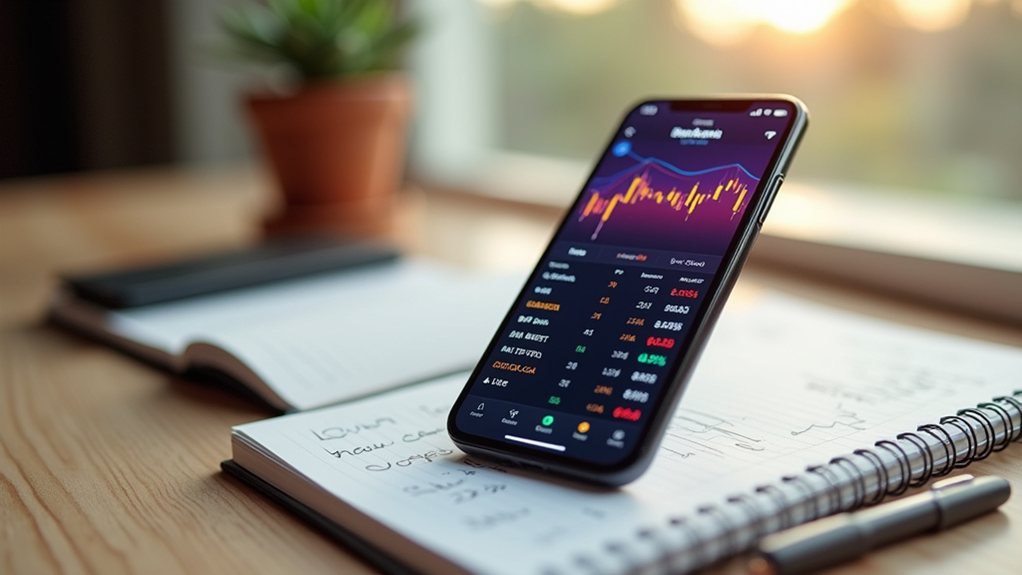A crypto wallet isn't a wallet at all. It's digital infrastructure that stores private keys—not actual cryptocurrency. Think pocket-sized bank vault, but for blockchain access. These wallets come in various forms: hot (online), cold (offline), custodial (managed by third parties), or non-custodial (you're the boss). They handle transactions, display balances, and support multiple cryptocurrencies. Lose your private key? Your crypto's gone forever. The security features below might save your digital fortune.

Every crypto wallet packs a punch of essential functions that go way beyond just storing digital assets. They're actually complex tools that manage cryptographic keys while interfacing with various blockchains. At their core, these wallets handle a public key (your shareable address) and a private key (the ultra-secret code that grants access to your funds). Lose that private key, and kiss your crypto goodbye. No exceptions.
These wallets come in different flavors. Hot wallets stay connected to the internet—convenient but vulnerable. Cold wallets remain offline—safer but less accessible. It's a classic security-versus-convenience tradeoff. Some people trust exchanges with custodial wallets where the platform holds your keys. Brave souls opt for non-custodial options and maintain full control. Popular software wallets like MyEtherWallet and Electrum offer user-friendly interfaces for managing your cryptocurrencies. Then there's the multi-signature route, requiring multiple approvals for transactions. Extra hurdles, extra security.
Security features vary widely across wallet options. Encryption protects your data. Two-factor authentication adds a layer of defense. Fancy wallets incorporate biometrics—scan a fingerprint, access your Bitcoin. PIN codes serve as numeric gatekeepers. Some wallets let you whitelist addresses, limiting where funds can go. Still, hackers persist. They're persistent like that.
Transaction capabilities define a wallet's everyday usefulness. Send crypto. Receive crypto. Check balances. Review history. Most modern wallets support multiple cryptocurrencies—no need for separate apps for each coin. They also let users adjust transaction fees. Pay more, get processed faster. That's blockchain for you.
Under the hood, wallets constantly sync with the blockchain. They broadcast your signed transactions to the network and verify incoming transfers. Each wallet generates unique addresses and supports various blockchain protocols. Bitcoin, Ethereum, Solana—the wallet bridges them all. Technology working silently in the background. Remember that the wallet uses an HD structure to manage multiple accounts with just one Secret Recovery Phrase.
Recovery options matter most when disaster strikes. The seed phrase—those 12-24 random words—serves as your ultimate backup. Store it properly. Some wallets offer cloud backups (encrypted, hopefully) or local storage options. Old-school users prefer paper backups. The truly innovative use social recovery systems where trusted contacts help restore access. Without proper inheritance planning, your crypto assets could become permanently inaccessible to your heirs if you pass away.
Modern wallets keep adding flashy features. Built-in exchanges for swapping coins without leaving the app. DApp browsers for accessing decentralized applications. NFT support for digital collectibles. Staking capabilities for earning passive income. Hardware wallet connectivity for extra security.
The simple crypto wallet of yesterday has evolved into a full financial ecosystem. Progress happens fast in crypto. Blink and you'll miss it.
Frequently Asked Questions
Are Crypto Wallets Insured Against Theft or Hacks?
Most crypto wallets aren't insured. Tough luck.
Traditional financial protections like FDIC don't cover cryptocurrency. Some exchanges offer limited insurance – Coinbase covers hot wallet breaches, Gemini has $200 million in custody insurance.
Self-custody? You're on your own. Lose those private keys and your funds are gone forever.
Specialized crypto insurance products are emerging through providers like Nexus Mutual and InsurAce, but they're still developing.
Can I Recover My Wallet if I Lose My Seed Phrase?
Recovering a wallet without a seed phrase? Good luck with that.
In most cases, it's game over. Permanent loss. Period.
Some wallets offer recovery options, and exchanges might help with hosted wallets. Multi-sig setups provide alternatives, and third-party services exist—with risks attached.
But really, once that seed phrase is gone, so is your crypto. No central authority to bail you out. Tough break.
Do Crypto Wallets Work Offline?
Yes, some crypto wallets work completely offline.
Cold storage wallets like hardware devices keep private keys offline – that's their whole point.
Air-gapped systems never touch the internet.
Want to use them? You'll need to sign transactions offline, then transfer the signed transaction to an online device for broadcasting.
It's a trade-off: inconvenient but secure.
The keys never get exposed to online threats.
Pretty smart, actually.
What Fees Are Associated With Using Crypto Wallets?
Crypto wallets come with several fees.
Network transaction fees are unavoidable—Bitcoin might cost $1-$5, while Ethereum ranges from $2-$50.
Exchange trading? That'll hit you for 0.1%-0.5%.
Withdrawals can sting at $1-$25.
Don't forget gas fees for DeFi transactions, sometimes exceeding $100.
Fees vary with network congestion, transaction complexity, and the cryptocurrency type.
Layer 2 solutions and timing transactions during low-traffic periods can help.
Can I Transfer Between Different Cryptocurrency Wallets?
Yes, users can transfer between different crypto wallets. The catch? Same cryptocurrency only. Bitcoin to Bitcoin. Ethereum to Ethereum.
Moving between wallets requires copying the recipient's address, selecting the amount, and confirming. No shortcuts. Network compatibility matters—send Bitcoin to a Bitcoin-only wallet, not an Ethereum one.
Mess up? Funds gone forever. Double-check those addresses. Transaction fees vary based on network congestion.








